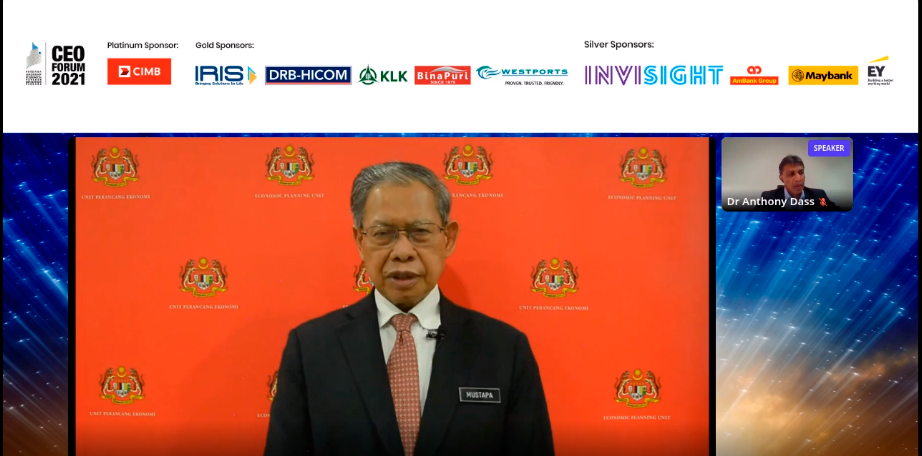PETALING JAYA: The government will intensify its efforts to help micro, small and medium enterprises (MSMEs), especially small business owners, by implementing income-raising and capacity-building programmes in urban and rural areas, as well as by encouraging entrepreneurship and access to financing facilities, said Minister in the Prime Minister’s Department (Economy) Datuk Seri Mustapa Mohamed.
Mustapa said the government has recognised that it cannot adopt a “business-as-usual” approach in dealing with post-pandemic challenges.
“Some of the vulnerabilities and weaknesses exposed by this crisis are certainly not new. Hence, it is imperative that the government take this opportunity to reform the economy and ‘build back better’.
“In building back better, the 12th Malaysia Plan (12MP) aims to ensure that we can achieve high income status by 2025 and be more sustainable in order to ensure that we can become a carbon neutral country at the earliest in 2050. The plan will also provide more balanced development across regions and states to ensure that the fruits of development are equally shared by our citizens,” Mustapa said in his keynote address (pix) on “Shifting the Malaysian Economy Into Higher Gear: Assessment, Strategy, and Action” at the virtual Perdana Leadership Foundation CEO Forum 2021 today.
He added that the government’s priorities in the next five years include increasing incomes, eliminating absolute poverty, and reducing development gaps between states and regions, as well as ensuring quality growth that is sustainable.
At the forum’s plenary session “The New Paradigms for Business & The Malaysian Economy”, Universiti Malaya Social Wellbeing Research Centre director Prof Datuk Norma Mansor said that in spite of eight packages introduced by the government since 2020 to support businesses and domestic demand, more longer term and sustainable policies are required to address the near-term problems Malaysia is facing.
“Due to lockdowns, unemployment, and businesses folding up, the structure of inequality has deepened. It is not just in terms of wealth inequality because bigger companies and the wealthier individuals and companies are able to build on their riches by purchasing assets and enabling them to further rebuild and consolidate during this period. While for small businesses and individuals who are in the lower income groups, they are the ones who are losing out despite the government support, they cannot recover the losses they suffered during the Covid-19 crisis,” she said.
Norma said there are 907,000 small and medium enterprises (SMEs) and micro enterprises in Malaysia that have been impacted by Covid-19 and it is impossible for them to predict what will come next. Thousands of businesses have closed and about 770,000 remain unemployed since 2020 due to prolonged lockdowns despite stimulus packages amounting to RM530 billion introduced by the government.
“It is crucial to have good social protection to support the economy in which it can lead businesses to thrive during the good times and to provide support when businesses are facing a crisis.
“We are slow in opening data. Innovative digital entrepreneurs (from other countries) have used censors, health, transportation and other data shared on government platforms to create services that have economic or social benefits for their fellow citizens. Data openness is a positive thing that we have to work on especially in this country. The greater transparency in general would lead to healthier investment and business climate and this can also enhance public service delivery particularly in the areas of social protection,” she said.
In the same plenary session, AmBank Group wholesale banking managing director Raja Teh Maimunah Raja Abdul Aziz said the pandemic has accelerated digital transformation but there is a huge divide between businesses and organisations that can afford the digital adoption in purchasing technology and train their people; and those who cannot afford to do so.
“Micro enterprises make up of 80% of SMEs and their growth has been huge at 5% every year but they were absolutely not ready for digital adoption. The un-readiness is still visible 18 months down the road.
“A number of micro enterprises clients do not have something as simple as connection or online payments capability. They were in a cash economy when the pandemic hit them in March, 2020 and they do not have an alternative distribution channel.
“Not everything needs to move online, what we need to build in our micro enterprises is the understanding that they have to have multiple distribution channels, they need to be able to fulfil offline and online. Those who are not ready are those requiring huge financing assistance,” she said.
Availability of ICT infrastructure, connectivity, and affordability of acquiring smart devices are factors that affect micro enterprises from moving on, she added.













